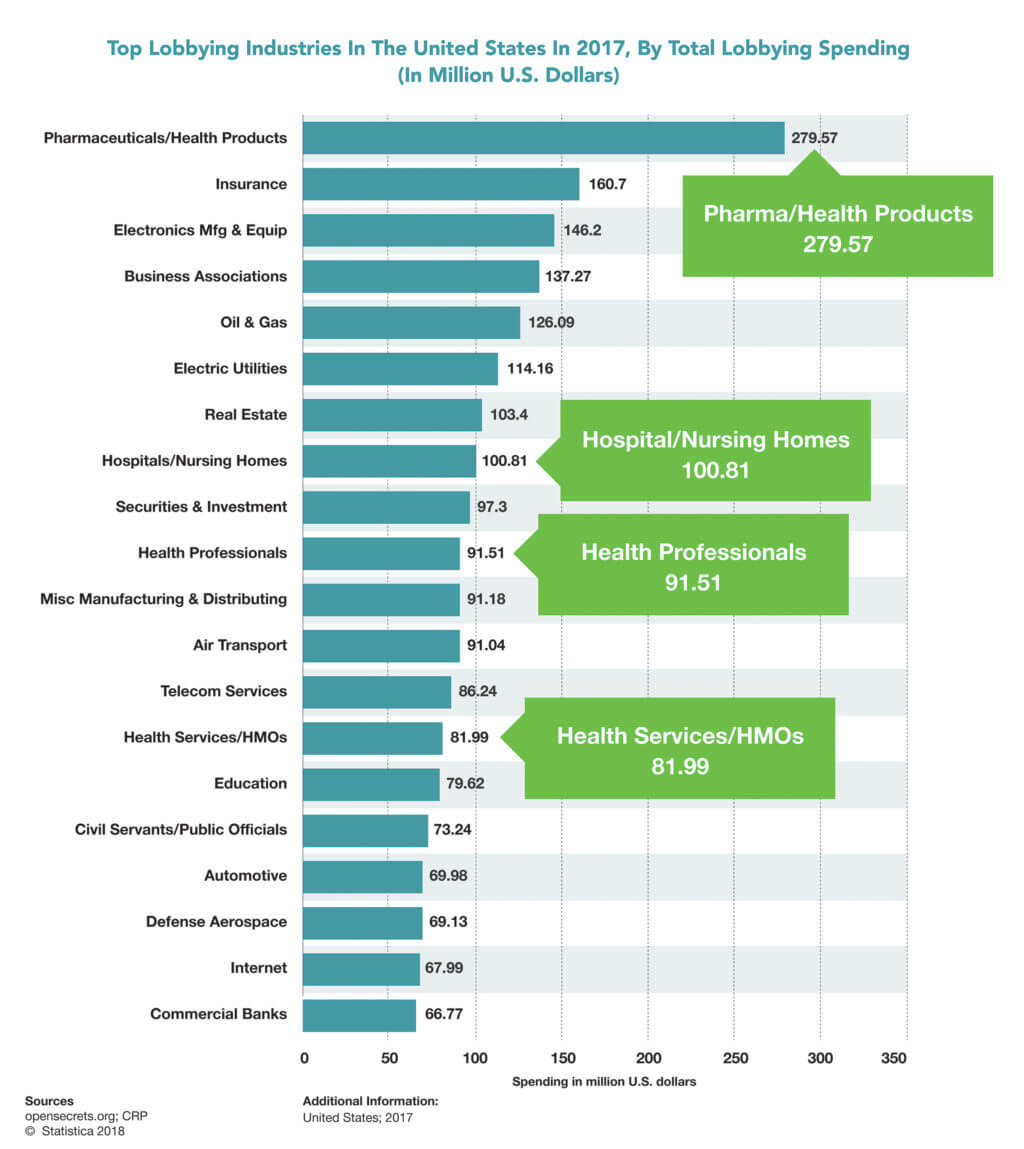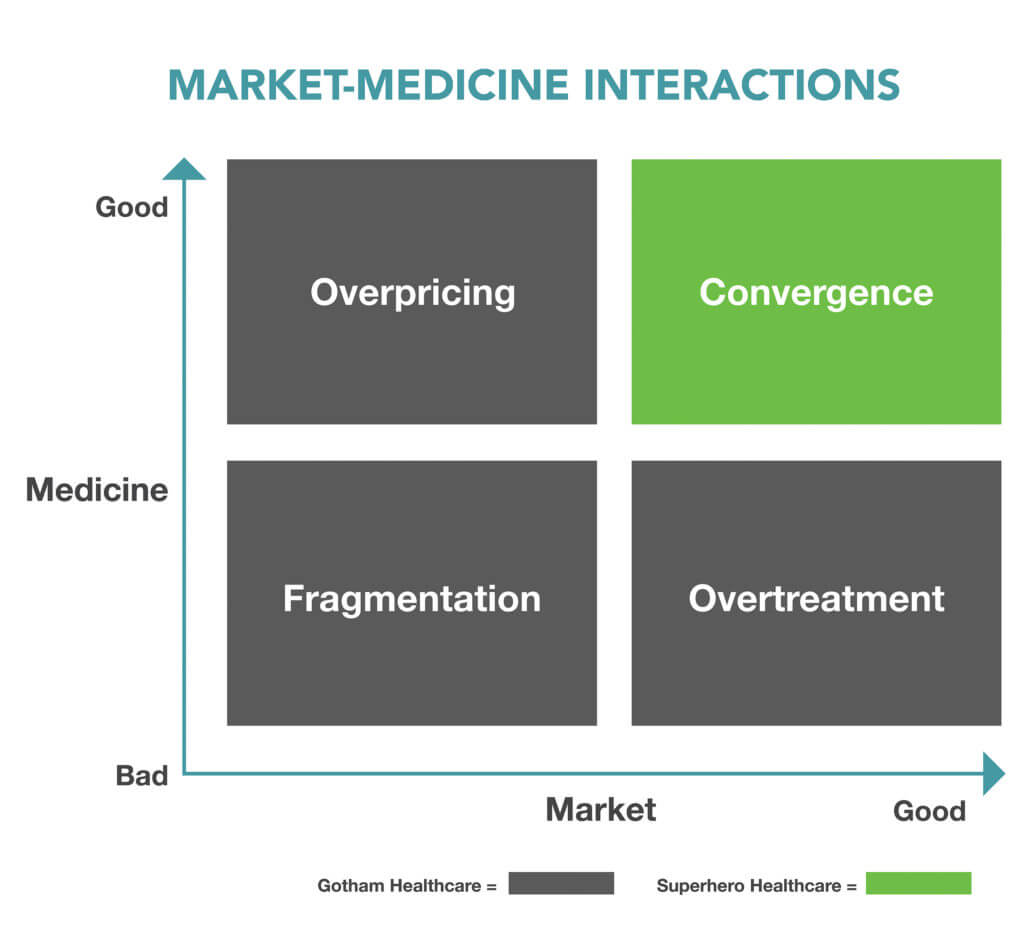June 6, 2018

Pro-Market and Pro-Business: Not Always the Same, Particularly in Healthcare
Shortly after publishing Market vs. Medicine: America’s Epic Fight for Better, Affordable Healthcare in June 2016, I met with my former investment banking colleague, Jullia Quazi. Jullia arrived with a very funny story regarding her precocious and freaky-smart 6-year-old son Kairan.
As Jullia was leaving home, Kairan asked her to ask me who won. When Jullia asked what he meant, Kairan responded, “Dave wrote Market vs. Medicine. Who won, “Market” or “Medicine?” Out of the mouths of babes…
A core thesis in Market vs. Medicine is that U.S. healthcare operates within an artificial “fee-for-service” (FFS) economic model where supply drives demand. For example, the best predictor of cardiac procedures in any given market is the number of cardiologists. They and other providers literally create their own demand.
FFS medicine is fragmented, wastes vital resources and often ignores patient needs. In their rush to optimize revenues and profits, health companies deliver suboptimal outcomes, quality and customer experience.
Market vs. Medicine’s core belief is that bottom-up, market-driven innovation will transform U.S. healthcare in the same way it has transformed other industries: by giving customers the services they want, need and desire, at competitive prices.
Unfortunately, “market” and “medicine” are often in conflict with one another. “Pro-market” forces seek to overturn entrenched and wasteful “pro-business” practices through level-field competition.
“Pro-marketeers” want buyers of healthcare services to determine “market fitness” through their purchasing decisions. Demand-driven change generates superhero results when buyers, not suppliers, drive value creation.
PRO-MARKET VS PRO-BUSINESS
In A Capitalism for the People: Recapturing the Lost Genius of American Prosperity (2012), University of Chicago economist Luigi Zingales makes the nuanced and powerful observation that being “pro-business” is not the same as being “pro-market.”
In a 2012 interview with The Economist, Professor Zingales describes how “crony capitalism” comingles and confuses what constitutes being pro-market and pro-business.
There is not a well-understood distinction between being pro-business and pro-market. Business people like free markets until they get into a market; once they are in, they want to block entry to others. Pro-marketeers want free markets at all times.
The more conservative pro-marketeers are fearful of criticizing business, because they assume they will be seen as criticizing the free market. But we need to stand up and criticize business when business is not helping the cause of the free market.
Zingales cites rampant cronyism as one feature of a system that is more pro-business than pro-market. Large industries tinker with regulatory oversight and enforcement to optimize revenues, reduce tax liabilities, limit competition and minimize oversight. It’s easier than creating value in competitive markets. There’s too much cronyism in healthcare.
Pro-market activities support competition, transparency and accountability. They sustain efficient markets and deliver value to consumers.
Industry “capture” of the government’s policymaking apparatus is dangerous to democracy. President Trump’s frequent calls to “drain the swamp” reflect the American people’s collective frustration. Only one third of Americans say they can trust their government “to do what is right,” a decline of 14 points from 2017. (1)
Unfortunately, the “swamp” is thriving, bi-partisan and aggressively pursuing its interests. Metropolitan Washington, D.C. is home to 5 of the nation’s 6 highest-income counties. This translates into legions of highly trained professionals working to nudge government policies and regulations in ways that favor vested interests.
What’s good for Washington, D.C. harms the rest of the country. Monopsonist market behaviors deprive communities, employers and individuals of vitally needed resources. We the people have to fight back by demanding greater transparency and accountability. As Supreme Court Justice Louis Brandeis once rightly observed,
Publicity is justly commended as a remedy for social and industrial diseases. Sunlight is said to be the best of disinfectants; electric light the most efficient policeman.
Toward that end, Professor Zingales believes that an independent press, class-action lawsuits and “whistleblowers” are necessary counterweights to powerful vested interests. Properly exercised, they give voice to societal concerns and expose corporate overreach.
A ROCKFORD TRAVESTY

On May 10th, 60 Minutes broadcast a story depicting how purchasing Acthar threatened the financial stability of Rockford, Illinois. The self-insured municipality spent almost $500,000 on the drug in 2015 to treat two babies suffering from infantile spasms, a rare disease that affects 2,000 babies annually in the U.S.
Acthar is an off-patent drug that came to market in 1952. In 2001, one dosage of Acthar cost $40. Today a single dosage costs $40,000, a whopping 100,000 percent increase. To pay for Acthar, Rockford has reduced spending on law enforcement and firefighting.
Despite significant effort, Rockford’s former mayor (Larry Morrissey) was unable to puncture pharma’s veil of secrecy to learn why and how Acthar’s price increases had occurred. The facts only came out when the drug’s manufacturer, Mallinckrodt, paid a $100 million fine to settle an FTC antitrust lawsuit. The company admitted no wrongdoing.
The suit alleged the Acthar’s previous manufacturer, Questcor, had acquired the Synacthen (a low-cost drug competing with Acthar) to limit competition. First Questcor and then Mallinckrodt took Synacthen off market, so Acthar was the only version available. As part of the FTC settlement, Mallinckrodt licensed Synacthen to West Pharmaceuticals, another company that will offer Synacthen.
The seemingly large $100 million fine represents roughly one month of Acthar profits for Mallinckrodt. It’s a proverbial drop in the company’s overflowing pharma bucket. (2)
Despite limited evidence of treatment efficacy, Medicare funds $500 million in Acthar prescriptions each year. At $162,317, Acthar was Medicare’s most expensive drug per patient in 2015. (3)
Mallinckrodt aggressively markets the drugs to prescribing physicians and rewards them with honorariums, speaking fees and other benefits that can add hundreds of thousands annually to physicians’ income. Acthar sales constituted 37% of Mallinckrodt’s third-quarter sales in 2016. (2)
PRO-BUSINESS SHENANIGANS
Like many pharmaceutical companies, Mallinckrodt invests heavily in lobbying. The company spent $610,000 lobbying Congress the first quarter of 2017, triple the amount for the same period in 2015. (4)
Mallinckrodt is not an isolated example. No industry plays the legislative game better than healthcare. Health is proactive in seeking to influence legislators and regulators. Incumbents strive to tilt market dynamics in their favor. The more monopolistic the better.

Sources: opensecrets.org; CRP (C) Statistic 2018
Lobbying works. Government subsidies distort the healthcare marketplace. Health companies gain higher returns walking the halls of Congress than by creating marketplace value.
In 2016, pharma spent almost $100 million more on lobbying than the next highest-spending industry group. Hospitals, health insurers, nursing homes, specialty societies, healthcare professionals, medical device manufacturers and other healthcare services companies are also big spenders.
Crony capitalism “tilts” the competitive playing field in favor of incumbents at the expense of the American people. It rewards connection and stifles innovation. There’s too much crony capitalism in healthcare.
A HEALTHCARE “SCORECARD” FOR THE PEOPLE
There are good and bad medical practices just as there are good and bad market behaviors. Clarifying the characteristics and implications of market-medicine interactions is essential for understanding U.S. healthcare’s structural flaws and how proper market function corrects them.
Building on young Kairan’s intriguing question, we created a scoring matrix that categorizes good and bad healthcare practices.
- Good initiatives advance market-driven reform by rewarding innovative organizations that deliver better outcomes, lower costs and/or superior customer service. This is Superhero Healthcare.
- Bad initiatives strengthen incumbents through regulatory manipulation, market concentration and/or lack of transparency to perpetuate the status quo system. This is Gotham Healthcare.
Fundamentally, good market developments are pro-market and pro-consumer while bad market developments are anti-market and pro-business. This is not a well-understood distinction.
Business activities can be either pro-market or anti-market. At their worst, pro-business policies degenerate into crony capitalism. They support monopolistic practices, distort market function and steal from consumers.
The marketing and pricing of the drug Acthar is a textbook study in crony capitalism. There are way too many Acthar-like practices operating in Gotham Healthcare.

At its worst, Gotham Healthcare encapsulates the lethal combination of bad medical practices and bad market behaviors. Fragmented, over-priced care delivery (lower-left quadrant) that ignores customer needs is the result. These pernicious habits riddle American healthcare, robbing the American people of vital care while stealing vital societal resources.
Mispriced and over-priced appropriate care (upper-left quadrant) is also wasteful. A $5000 MRI may be necessary, but it’s wildly overpriced. Appropriately-priced bad medicine (lower-right quadrant) constitutes overtreatment. An unnecessary MRI is wasteful even if it only costs $500.
Fragmentation, Overtreatment and Overpricing are the three faces of Gotham Healthcare. They thrive in opaque and unaccountable operating environments. The American people deserve better. They deserve great healthcare at fair prices.
The harmonic convergence of holistic care delivery with efficient, transparent markets produces Superhero Healthcare (upper-right quadrant). There are pockets of Superhero Healthcare practiced in America, but they are the exception, not the rule.
By definition, Superhero Healthcare is pro-market. It supports level-field competition, transparency and accountability. It sustains efficient markets and delivers value to consumers.
Pro-market health companies deliver the right care at the right time in the right place at the right price, centered on what patients/customers need, want and desire.
A PRO-MARKET MANIFESTO FOR HEALTHCARE TRANSFORMATION
Competition is hard but makes companies better. Free markets depend on balanced regulation and effective enforcement to ensure “level-field” competition.
Preserving competitive markets is a delicate exercise that requires constant vigilance and tinkering. Too much regulation and overly vigorous enforcement burden productive companies, stifle innovation and exert a negative drag on the economy.
Too little regulation and feeble enforcement encourage negligent corporate behavior, create moral hazard and increase societal harm. This also retards innovation and economic growth.
The constant challenge for the American government is to find a Goldilocks balance where regulation and enforcement protect societal interests, encourage innovation and stimulate economic growth.
Given its high-cost, pervasive fragmentation and embedded inefficiencies, U.S. healthcare must become more pro-market (value-enhancing) and less pro-business (status quo preserving).
Superhero Healthcare must displace Gotham Healthcare. American consumers need appropriate governmental oversight and regulation with effective enforcement powers to sustain market-driven healthcare reform. Pro-market companies will win by delivering better, more convenient healthcare services at lower costs. In a robust healthcare marketplace, outcomes matter, customers count and value rules.
SOURCES
- https://www.theatlantic.com/international/archive/2018/01/trust-trump-america-world/550964/
- https://www.bloomberg.com/gadfly/articles/2017-01-19/mallinckrodt-s-acthar-worries-aren-t-over
- https://www.nytimes.com/2016/12/23/business/drug-price-medicare-mallinckrodt-acthar.html
- https://www.nytimes.com/2017/07/21/business/a-drug-maker-spends-big-in-washington-to-make-itself-heard.html





